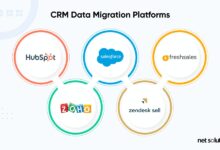Enterprise CRM Implementation Services: 7 Powerful Steps to Success
Implementing enterprise CRM implementation services can transform how your business manages customer relationships—when done right. This guide breaks down the entire process, from strategy to post-launch optimization, with actionable insights and expert-backed methods.
Understanding Enterprise CRM Implementation Services

Enterprise CRM implementation services are specialized solutions designed to help large organizations deploy Customer Relationship Management (CRM) systems effectively. Unlike off-the-shelf CRM setups for small businesses, enterprise-level implementations involve complex integrations, extensive customization, data migration, and alignment with existing business processes across departments like sales, marketing, customer service, and IT.
These services are typically offered by certified vendors, consulting firms, or system integrators who bring deep technical expertise and industry-specific knowledge. The goal is not just to install software but to ensure the CRM becomes a strategic asset that drives efficiency, improves customer satisfaction, and supports long-term growth.
According to Gartner, enterprises that invest in professional CRM implementation services see up to 3x higher user adoption and 40% faster time-to-value compared to DIY approaches.
What Sets Enterprise CRM Apart?
Enterprise CRM systems are built for scale, security, and complexity. They support thousands of users, integrate with ERP, HR, and legacy systems, and often require multi-region or multi-language capabilities. This level of sophistication demands more than just technical setup—it requires change management, training, and governance.
- Support for large user bases across global teams
- Advanced security and compliance features (e.g., GDPR, HIPAA)
- Highly customizable workflows and automation
- Real-time analytics and AI-powered insights
Because of these demands, enterprise CRM implementation services go beyond installation—they encompass strategy, architecture design, data governance, and continuous optimization.
Key Players in the CRM Implementation Space
Major CRM platforms like Salesforce, Microsoft Dynamics 365, Oracle CX, and SAP Customer Experience dominate the enterprise space. Each offers robust ecosystems supported by global networks of implementation partners.
For example, Salesforce Consulting Services provides end-to-end support for enterprise clients, including strategy workshops, data migration, and change management. Similarly, Microsoft partners certified under the Solutions Partner for Customer Engagement program deliver tailored Dynamics 365 deployments.
“A successful CRM implementation isn’t measured by go-live date—it’s measured by user adoption, data quality, and business outcomes six months after launch.” — CRM Industry Expert, Forrester Research
The Strategic Importance of Professional CRM Implementation
Why do so many enterprises fail at CRM adoption? Studies show that nearly 70% of CRM projects fall short of expectations, often due to poor planning, lack of executive sponsorship, or inadequate change management. This is where enterprise CRM implementation services become indispensable.
Professional services bring structure, best practices, and risk mitigation strategies that internal teams may lack. They help define clear objectives, align stakeholders, and create a roadmap that ensures the CRM delivers measurable ROI.
Aligning CRM with Business Goals
One of the first steps in any enterprise CRM implementation is aligning the project with overarching business goals. Is the goal to increase sales productivity? Improve customer retention? Streamline service operations?
Implementation consultants work with leadership to translate these goals into technical requirements. For instance, if the objective is to reduce customer response time, the CRM must be integrated with service desks, equipped with AI chatbots, and configured for omnichannel support.
- Define KPIs such as lead conversion rate, customer lifetime value, or first-contact resolution
- Map CRM capabilities to specific business outcomes
- Establish accountability through governance committees
Without this alignment, even the most advanced CRM system risks becoming an expensive digital filing cabinet.
Reducing Risk and Accelerating Time-to-Value
Enterprise CRM implementation services significantly reduce project risk. Consultants have seen common pitfalls before—data silos, integration failures, user resistance—and know how to avoid them.
They use proven methodologies like Agile, Waterfall, or hybrid models to manage timelines and deliverables. Many also leverage pre-built accelerators, templates, and industry-specific solutions to speed up deployment.
A study by Nucleus Research found that companies using professional implementation services achieved ROI in CRM projects 8 months faster than those relying solely on internal resources.
“Time-to-value is critical in enterprise software. Every month of delay costs millions in lost productivity and missed opportunities.” — Technology Strategy Lead, Deloitte
Phases of Enterprise CRM Implementation Services
A successful CRM rollout follows a structured lifecycle. While methodologies vary, most enterprise CRM implementation services follow a six- to seven-phase approach. Understanding these phases helps organizations prepare, allocate resources, and set realistic expectations.
Each phase builds on the previous one, ensuring that technical, operational, and human factors are addressed systematically.
Phase 1: Discovery and Requirements Gathering
This initial phase sets the foundation. Consultants conduct stakeholder interviews, process mapping sessions, and current-state assessments to understand business needs.
Key activities include:
- Identifying pain points in current customer management processes
- Documenting functional and non-functional requirements
- Defining success metrics and project scope
The output is a comprehensive requirements document that guides all subsequent decisions. Skipping this step often leads to scope creep and misaligned expectations later.
Phase 2: System Design and Architecture
Once requirements are clear, the next step is designing the CRM architecture. This includes data model design, integration points, security policies, and user interface layouts.
Consultants use tools like entity relationship diagrams (ERDs) and integration flowcharts to visualize how the CRM will interact with other systems. They also decide whether to use cloud, on-premise, or hybrid deployment models.
For example, a financial services firm might require on-premise hosting for compliance, while a global retailer may opt for multi-cloud deployment to support regional operations.
Phase 3: Configuration and Customization
This is where the CRM starts taking shape. Based on the design, consultants configure modules like sales force automation, marketing automation, and service cloud.
Customization may include:
- Building custom objects and fields
- Creating workflows, approval processes, and automation rules
- Designing dashboards and reports
While some customization is necessary, over-customization can lead to upgrade challenges and performance issues. Enterprise CRM implementation services help strike the right balance between out-of-the-box functionality and tailored features.
Data Migration and Integration Strategies
Data is the lifeblood of any CRM system. Poor data quality or incomplete migration can doom a project before it launches. Enterprise CRM implementation services prioritize data integrity through structured migration and integration strategies.
This phase often consumes 30–40% of the total project effort, underscoring its importance.
Data Cleansing and Enrichment
Before migrating data, it must be cleaned. This involves removing duplicates, correcting errors, standardizing formats (e.g., phone numbers, addresses), and filling missing fields.
Tools like Informatica, Talend, or native CRM data quality modules are used to automate this process. Consultants also establish data governance policies to maintain quality post-go-live.
“Garbage in, garbage out. No CRM can deliver insights if the underlying data is flawed.” — Data Governance Specialist, Accenture
Integration with Existing Systems
Enterprises rarely operate in isolation. CRM systems must integrate with ERP (e.g., SAP, Oracle), marketing automation (e.g., Marketo, HubSpot), e-commerce platforms, and communication tools (e.g., Microsoft Teams, Slack).
Implementation services use APIs, middleware (like MuleSoft or Dell Boomi), or point-to-point connectors to enable seamless data flow. They also design integration architectures that are scalable and secure.
For example, a manufacturing company might integrate its CRM with an ERP system to sync customer orders, inventory levels, and delivery schedules in real time.
Testing Data Integrity and Performance
After migration and integration, rigorous testing ensures data accuracy and system performance. This includes:
- Unit testing individual components
- Integration testing across systems
- User acceptance testing (UAT) with real-world scenarios
- Load and stress testing to simulate peak usage
Any discrepancies are logged and resolved before moving to production.
User Adoption and Change Management
Even the most technically perfect CRM will fail if users don’t adopt it. Research by PwC shows that low user adoption is the top reason for CRM project failure—accounting for over 50% of cases.
Enterprise CRM implementation services place strong emphasis on change management to drive adoption and minimize resistance.
Developing a Change Management Plan
A structured change management plan includes communication strategies, training programs, and leadership engagement. Consultants identify change champions within departments who can advocate for the new system.
The plan also addresses potential resistance by explaining the ‘what’s in it for me’ (WIIFM) for different user groups—sales reps, service agents, managers, etc.
Role-Based Training Programs
One-size-fits-all training doesn’t work. Enterprise CRM implementation services design role-specific training modules that focus on daily tasks.
- Sales teams learn lead management, opportunity tracking, and forecasting
- Service teams are trained on case management, knowledge base usage, and SLA tracking
- Marketing teams focus on campaign management and lead nurturing
Training is delivered through a mix of live workshops, e-learning modules, and just-in-time job aids.
Ongoing Support and Feedback Loops
Post-launch support is critical. Consultants often set up help desks, create FAQs, and monitor user feedback during the first 90 days.
They also conduct regular check-ins to identify usability issues and gather suggestions for improvement. This feedback loop ensures continuous refinement of the system.
Post-Implementation Optimization and Scalability
Going live is not the end—it’s the beginning. The true value of enterprise CRM implementation services emerges in the post-launch phase, where optimization and scalability determine long-term success.
Organizations must continuously evolve their CRM to meet changing business needs and technological advancements.
Performance Monitoring and Analytics
After deployment, consultants help set up dashboards to track KPIs like user login rates, data entry completeness, and process efficiency.
Advanced analytics can reveal bottlenecks—such as slow approval workflows or underused features—that need tuning.
For example, if sales reps aren’t logging calls, the system might be too complex or slow. Optimization could involve simplifying the interface or enabling voice-to-text logging.
Scaling for Growth and New Use Cases
As businesses grow, so should their CRM. Enterprise CRM implementation services plan for scalability from day one.
- Adding new modules (e.g., field service, partner relationship management)
- Expanding to new regions or subsidiaries
- Integrating AI and machine learning for predictive analytics
A global logistics company, for instance, might start with sales and service modules and later add IoT integration to track shipment status in real time.
Continuous Improvement Through Updates
CRM platforms release regular updates—quarterly for Salesforce, biannually for Dynamics 365. Enterprise CRM implementation services help organizations plan for these upgrades without disrupting operations.
This includes testing new features, retraining users, and adjusting customizations to remain compatible.
“The best CRM systems are never ‘done.’ They evolve with the business.” — CIO, Global Retail Chain
Choosing the Right Enterprise CRM Implementation Partner
Not all implementation providers are equal. Selecting the right partner can make or break your CRM project. Enterprise CRM implementation services vary widely in expertise, industry focus, and delivery models.
Here’s how to choose wisely.
Evaluating Partner Expertise and Certifications
Look for partners with official certifications from CRM vendors. For example:
- Salesforce: Platinum or Premier Consulting Partner status
- Microsoft: Gold or Solutions Partner for Customer Engagement
- Oracle: OPN Specialized Partner
These certifications indicate proven experience, access to vendor resources, and adherence to best practices.
Industry-Specific Experience Matters
A partner with deep experience in your industry—healthcare, finance, manufacturing, etc.—understands your regulatory, operational, and customer engagement challenges.
Ask for case studies or client references in your sector. A partner that has implemented CRM for a similar-sized organization in your field brings invaluable insights.
Support Model and Long-Term Partnership
Consider not just implementation but ongoing support. Does the partner offer managed services? Do they provide proactive monitoring and optimization?
The best enterprise CRM implementation services view themselves as long-term partners, not just project vendors.
What are enterprise CRM implementation services?
Enterprise CRM implementation services are professional consulting and technical services that help large organizations deploy, configure, integrate, and optimize CRM systems. These services cover strategy, data migration, customization, user training, and post-launch support to ensure the CRM delivers maximum business value.
How long does a typical CRM implementation take?
For enterprise organizations, CRM implementation typically takes 6 to 12 months, depending on complexity, data volume, integration needs, and organizational readiness. Smaller deployments may take 3–6 months, while highly complex global rollouts can extend beyond 18 months.
What are the biggest challenges in CRM implementation?
Common challenges include poor data quality, lack of user adoption, unclear business objectives, insufficient executive sponsorship, and integration with legacy systems. Professional enterprise CRM implementation services help mitigate these risks through structured planning and change management.
Can CRM be implemented without external consultants?
While technically possible, self-implementation carries high risks for enterprises. Without expert guidance, organizations often face delays, budget overruns, and suboptimal configurations. Most large companies benefit significantly from using certified implementation partners.
How do you measure the success of a CRM implementation?
Success is measured by KPIs such as increased sales productivity, improved customer satisfaction (CSAT), reduced response times, higher user adoption rates, and ROI within 12 months. Post-implementation reviews and regular performance dashboards help track progress.
Enterprise CRM implementation services are not just about installing software—they’re about transforming how your organization engages with customers. From strategic planning to post-launch optimization, professional services ensure your CRM delivers real business value. By following structured phases, prioritizing data integrity, driving user adoption, and choosing the right partner, enterprises can avoid common pitfalls and achieve long-term success. The journey doesn’t end at go-live; continuous improvement is key to staying competitive in today’s customer-centric world.
enterprise crm implementation services – Enterprise crm implementation services menjadi aspek penting yang dibahas di sini.
Further Reading:


